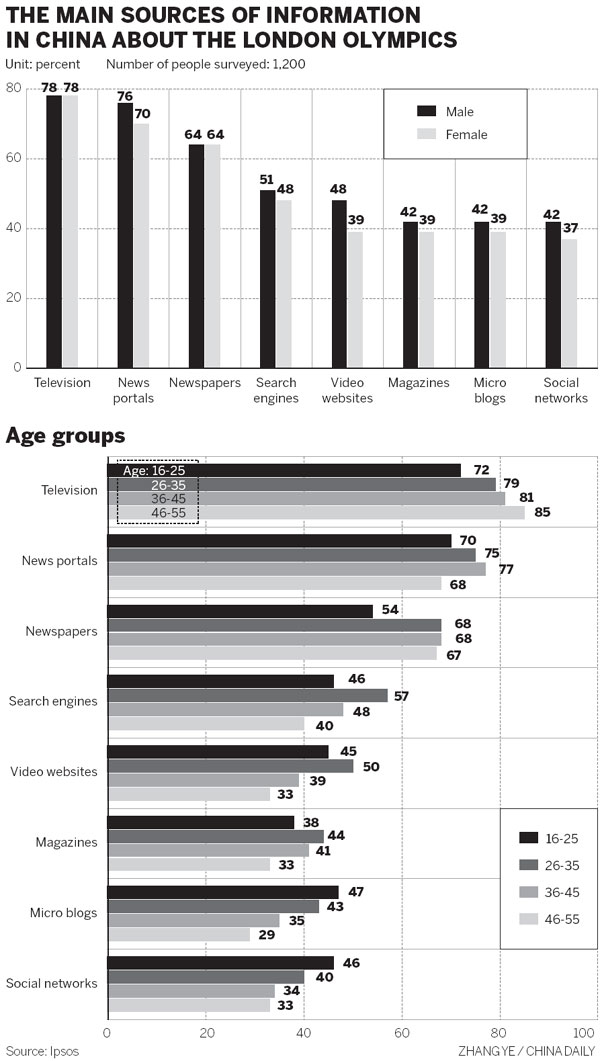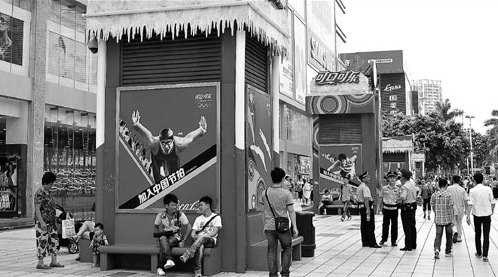Marketeers try to go distance with Games

|
Coca-Cola's China Beat advertisements in Shenzhen, Guangdong province. The promotional campaign aims to enhance the company's profile in light of the upcoming London Olympics. Provided to China Daily |
Major players' efforts in China may not be as effective as during 2008 Olympics
As the 2012 London Olympic Games draws near, the marketing campaigns of 11 large multinational corporations that have been designated as Worldwide Partners are gaining steam in London, in other parts of the United Kingdom, and in China.
To attract Chinese shoppers' attention, the companies are making full use of the rights granted them by the International Olympic Committee and are hoping to improve their corporate images and gain bigger market shares in the world's largest emerging market.
Will their efforts have the intended effects? Analysts forecast their influence might be moderate but still helpful to their businesses in China in the long run.
Long-term interest
There are 11 multinational corporations that have been deemed Worldwide Partners for the 2012 London Olympics, compared to 12 that were approved for the 2008 Beijing Games. Dow Chemical Co, Procter & Gamble Co and Taiwan's Acer Inc are the newcomers to the list this year. The other eight, including The Coca-Cola Co, Visa Inc and Samsung Group, participated in the past round.
The Olympic Partners program, or TOP program, was established in 1985. It is managed by the International Olympic Committee and is the only organization that can grant world-marketing rights for both the winter and summer Games.
In May, Dow said it will try to form a partnership in China to help promote the Olympic spirit and the National Fitness Program, and use its materials and knowledge to build sports venues and infrastructure.
According to Peter Sykes, president of Dow Greater China, the US-based company has just reached an agreement with the 2014 Nanjing Youth Olympic Games to provide coating materials for that event's Olympic Village.
According to China's Sports Industry Roadmap of the 12th Five-Year Plan (2011-15), the country will continue to promote its National Fitness Program and add to the number of sports venues in the country, taking it from 1 million to 1.2 million by 2015.
"Our partnership with the Olympics will help us grasp business opportunities at the 200,000 new venues in China," Sykes said earlier.
In addition to business considerations, he said, Dow believes the TOP program offers a good opportunity to make Dow's brand more widely recognized in China.
The chemical company's designation as a preferred partner is giving it access globally to substantial Olympic-related contracts, and Dow is aiming to generate more than $1 billion in additional sales by 2020.
The opportunities will relate to more than 30 Dow businesses, including building and construction, functional fluids, coating materials, wire and cable industries, and plastics.
Both the International Olympic Committee and the Worldwide Partners, including Dow, declined to disclose the cost of taking part in the TOP program, but insiders estimate it is as much as $80 million for a single company. That's based on an analysis that found that Lenovo Group Ltd spent $65 million in 2008 to obtain TOP authorization, and that the cost of getting one usually increases by between 15 and 20 percent from one Games to the next.
Sykes said Dow is the only one of this year's Olympic Worldwide Partners from the chemical industry. The company is seeking to use the program to promote the idea that chemical technology not only pertains to science but also to people's daily lives.
"As a B2B (business-to-business) company, it (an Olympic sponsorship) is the best, easiest and most visible way to lift our brand recognition," Sykes said.
"Dow has a long-term vision for the sponsorship and is eyeing the huge and long-term opportunities that exist in the Chinese market," said Liu Yan from the Beijing-based Nuomei Space Brand Consulting Co Ltd. "The purpose of this is to use an Olympic sponsorship to demonstrate the company's strength in the sports industry. But it will take time to see results."
P&G, for its part, is a newcomer to the TOP program and is therefore moving in a different direction.
It is using the opportunity to forge closer ties with buyers and to strengthen the association that exists in their minds between P&G and its internationally well-known brands: Pantene, Rejoice, Head & Shoulders, Safeguard, Olay, Pampers, Crest, Duracell and Gillette.
The nine brands are taking part in their parent company's Olympic marketing campaign - Thank You Mom - which is meant to honor "the unsung hero behind every athlete".
"P&G is in the business of helping moms," said Marc Pritchard, P&G global marketing and brand building officer.
"Through our Thank You Mom program, we will support not just the moms of Olympic athletes, but every mom who does whatever it takes to make her child's life the best it can be."
Liu Yan had similar thoughts.
"P&G is emphasizing the warm and soft side of life, in contrast to the strong, persistent and passionate nature of sports," he said. "I don't think this marketing strategy is much different from what the company does routinely. But this time, P&G is putting the spotlight on its corporate image instead of its sub-brands. Will this be for the best? Only time will tell."
Celebrity endorsement
P&G's sub-brands will also sponsor athletes in China, and they will be featured in advertising and retail campaigns.
Gillette plans to sponsor the Chinese "badminton superman" Lin Dan, and Crest has appointed He Wenna, who won a gold medal in the women's trampoline competition at the 2008 Games as its celebrity endorsement. Most of the Worldwide Partners, if not all, are using endorsements from sports celebrities in their marketing.
Coca-Cola, meanwhile, has started its own London Olympics' campaign entitled Move to the Beat, which in China is being called China Beat. It has also signed contracts with five world champions and Olympic champions, including 110-meter hurdles Olympic gold medalist Liu Xiang.
Elsewhere, Visa has selected the Chinese tennis French Open winner Li Na to form a Visa team with swimming champion Michael Phelps, pole-vault champion Yelena Isinbaeva and other international sports stars as a part of its Olympic marketing campaign, Go World.
"These Olympic Worldwide Partners attach a great deal of importance to the Chinese market, and are doing their best to provide local people, in their enthusiasm for local sports players, with what they want," said Zhou Gang, an independent analyst of the sports business.
Feng Bing, a 35-year-old Beijing resident, said he cannot say with certainty which athlete is working for which company.
"Liu Xiang has endorsed many brands," said Feng, who is a fan of football, basketball, tennis and racing. "What I can remember was from Yili, Amway and Coca-Cola. But I don't think I ever bought something from a company because it was endorsed by a celebrity."
Asked about Li Na, Feng said he wasn't certain if she is a spokeswomen for Visa, saying he knew she had endorsed Kunlunshan - a Chinese brand of mineral water.
Zhang Qing, CEO of the Beijing-based Key Solution consulting firm, said companies' attempts to market products in China as part of this year's London Olympics might not be as effective as similar campaigns that went on during the 2008 Beijing Games.
For one, China was the host of the 2008 Games, making it more likely that the Chinese would pay close attention to the event that year. This year, the sponsors cannot count on having such a following in the country.
As a result, their attempts to sell products in China will generally be regarded by the public as being indistinguishable from the routine marketing campaigns that big companies conduct during international sports events.
"(They are) not special at all," he added.
Second, the Chinese people's attitudes toward sports tournaments and athletic achievements have changed greatly since 2008. The fans themselves have become more objective and sophisticated and tend to give athletes and teams credit for working hard rather than only for winning medals.
Will such marketing plans be effective? It's difficult to say.
"For my part, I think P&G's Thank You Mom program - concentrating on the heroes behind celebrities and on mothers' affection for ordinary people, might be effective," said Zhou.
Zhang also noted that London clocks run seven hours behind those in China, a fact that might hinder the Worldwide Partners' marketing work.
"The number of people in China seeing live broadcasts will noticeably decrease compared with what was seen in the 2008 Games and the promotional effect will be smaller," he said.
He said more marketing may take place on new media such as websites, videos and micro blogs.
Coca-Cola, as part of its Olympic marketing campaign in China, has written a song for Chinese Olympic athletes and will invite ordinary Chinese to sing it and upload versions of it to the company's website. It then plans to remix the various versions and produce an anthem in support of the Chinese team.
"This year's campaign is rooted in the collaborative work and effort of every citizen to create a song of support," said David G. Brooks, Coca-Cola president for Greater China and Korea.
Market survey company Ipsos SA recently conducted an online survey that asked respondents which Olympic Worldwide Partner they could first call to mind. Fifty-one percent said Coca-Cola, 31 percent said Samsung, 19 percent said Lenovo, and 11 percent said Acer.
When the respondents were furnished with a list of the brands in the program and asked the same question, 66 percent of them said Coca-Cola, 52 percent said Samsung, 39 percent said Lenovo, and 30 percent said Acer.
The survey was specifically designed to gauge the marketing campaigns associated with the London Games. It was carried out in February and received responses from 1,050 netizens.
Albert Cai, digital research director of Ipsos China, said Olympic marketing can do much to burnish a brand's image, but won't take effect overnight.
"A company should combine its Olympic marketing package with a corporate long-term marketing strategy," he said.
Coca-Cola has been a partner of the International Olympic Committee since 1928. Zhou Gang attributed those long-standing close ties to Coca-Cola's marketing techniques, which change in accordance with current trends.
Contact the writers at liujie@chinadaily.com.cn and liwoke@chinadaily.com.cn

(China Daily 06/27/2012 page14)















